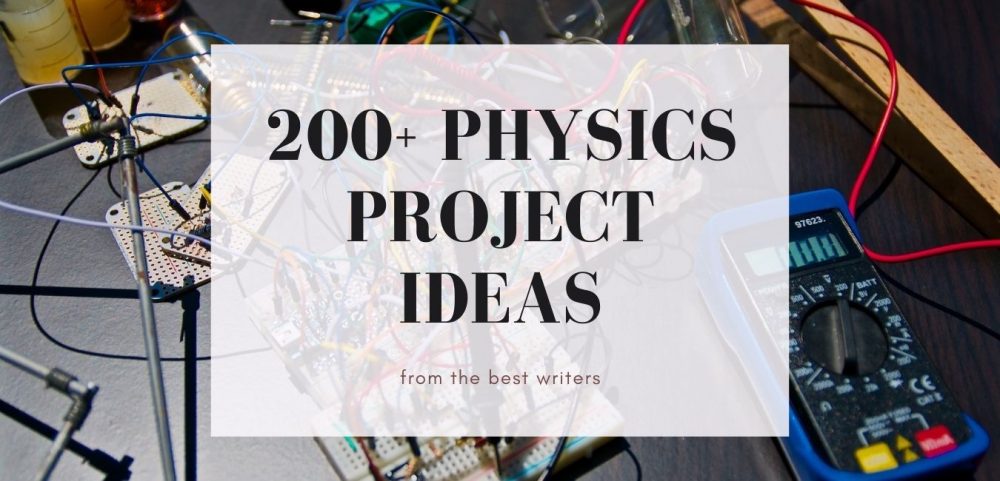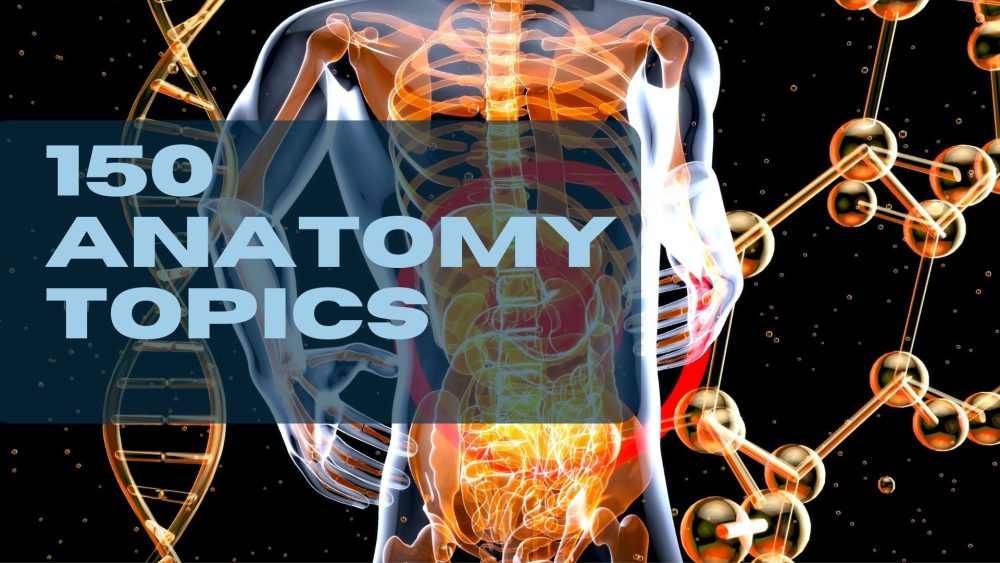200+ Unbeatable Physic Project Ideas For Every Student

Physics as a technical course is a pain in the neck for many students. Statistics have it that fewer students opt to major in Physics on campus. One can say that only the chosen few dares to take up this field of study. Are you one of those who feel blank when it comes to coming up with physic project ideas or physics homework?
Here is a chance to know how the experts do it.
Table of Contents
- What Is A Physics Project?
- How To Find Great Physics Topics
- Good Physic Motion Project Ideas
- Latest Science Physic Project Ideas
- Roller Coaster Ideas for Physic Project
- AP Physic Project Ideas
- Fun Physic Project Ideas
- Physics Science Fair Projects
- High School Science Fair Projects Physics
- Physics Science Experiments Project Ideas
- Easy Physics Projects For Students
- Bonus Physics Experiments Ideas
- FAQ
What Is A Physics Project?
It is an academic paper that deals with matter – what matter comprises, how it behaves, the laws and equations that describe it. The study of physics is a tremendous range of scales from the Big Bang, to subatomic particles, to modern physicists’ research.
When you are to develop a physics project idea, your instructor expects you to explain at least one of the aforementioned concepts. However, there’s a whole lot of impressive physics project ideas on the human scale too. We are going to explore some of them in a moment.
How To Find Great Physics Topics
The real test for most students comes when they have to source for physics project ideas. Of course, the class notes and textbooks are readily available. Despite all this, college and university students fumble to develop an exciting idea to present to their instructors.
Why should you struggle all that much, yet we have physics experts who have been in the business of writing for ages? Here are practical ways of finding researchable and easy physic project ideas for your next assignment:
- Research from reputable science websites
- Look for physics books from your school library
- Consult your supervisor
- Brainstorm with classmates
If the above methods are not working for you, our professional writers are here for do my homework. Just hit the order button and get your assignment rolling! How would you feel missing out on the graduation list just because of failing to complete such a task?
Look at some of our quality physics project ideas for your inspiration.
Good Physic Motion Project Ideas
- Discuss the ability of water surface tension to hold weight at a given temperature
- Describe the process of creating a lifter based on the Biefeld-Brown effect
- Evaluate how air pressure causes an egg to go into a bottle
- Discuss why quarters and feathers do not fall at the same acceleration speed when dropped
- Conduct an analysis of how different balls bounce and the factors that contribute to this difference
- Evaluate the amount of energy lost when friction occurs in motors of 100 watts
- Discuss the impact of lever length on the balance
- A case study to find out which laminated beam is the strongest
- How does the propeller size affect the thrust produced
- Analyze the various buoyancy forces with density
- Compare and contrast why a steel nail sinks while a steel ship floats
- The role of magnetic fields on the rate of flow of water
- Discuss how elevators work through a series of pulleys
- How the bounciness of a golf ball affects its travel distance
- The impact of shape and mass on an object’s velocity when sinking through water
- Effects of an inclined plane on how fast an object rolls
- Investigate the effectiveness of Bernoulli’s principle on objects of different shapes
- How can manufacturers create a fast-moving train?
- Describe the Third Law of Motion with a balloon-powered rocket car
- How Einstein’s theory of General relativity explains gravitation as space-time
Latest Science Physic Project Ideas
- Explain how white light forms from additive colors
- Describe the role of Newton’s Third Law of Motion constructing a balloon rocket car
- Discuss the working of electromagnetism by producing an electromagnet
- Factors considered when building an inclinometer
- How to create your lightning using homemade tools
- The impact of air pressure on the functioning of a plane
- Demonstrate the dynamics of air pressure using the floating ball experiment
- Discuss how the floating balloon is essential in demonstrating buoyancy of warm air
- Describe why glass can vibrate
- What are the limitations of Galileo’s falling objects experiment?
- What you need to construct a homemade windmill
- How to identify the inertia of a hard-boiled egg from among a dozen
- What is the principle behind demonstrating the earth’s magnetic field?
- Explain the relationship levers and force
- What is the science behind lifting an ice cube from water using a string?
- Why do people’s ears bock during a long journey in a car
- How to create long-lasting and permanent bubbles
- Demonstrate how one can intensify sunlight through a magnifying glass
- How a fuse does help prevent fire caused by faulty electrical wiring
- The impact of water displacement on floating and sinking of objects
Roller Coaster Ideas for Physic Project
- Describe the formation of static electricity and current electricity
- Describe the appearance of different pitched sounds
- Demonstrate the force of tension and its impact in constructing a ridge
- Demonstrate the application of Pascal’s law
- How to make a rainbow on a rainy day
- Demonstrate how one can use static electricity to separate salt from pepper
- The process of deriving secondary colors from primary colors
- The height of marble needed to make a complete loop of a specific size
- The impact of sound waves in various types of materials
- How to create a spectrum through water using a beam of light
- A case study of the strength of an eggshell
- How to determine the expansion of air when heated
- What is the impact of exposing rubber to high levels of heat?
- The application of the Pythagoras theorem in physics
- How colliding participles behave in a closed chamber
- The effect of temperature on sound waves
- Analyze Bernoulli’s principle
- How do impurities affect the boiling point of water?
- The process of water distillation using charcoal and sand
- The role of physics in the growing population
AP Physic Project Ideas
- Discuss the properties of mass and charge as seen in various objects
- How do fields that exist in space interact with one another?
- Describe the interaction between objects about force
- How does change in system interactions affect their stability?
- Describe conservation laws that determine interactions
- Illustrate how waves can transfer energy and momentum
- How kinematics is crucial in the study of physics
- The link between torque and rotational motion among objects
- Describe the single harmonic motion
- Factors that facilitate circular motion and gravitation
- The contribution of mechanical waves and sound
- Determinants of electric charge and electric force
- How to apply kinematic equations to solve scenarios involving linear motion
- Interpreting and translating between position-time, velocity-time, and acceleration-time graphs
- Study the behavior of objects while in motion
- How to represent forces as vectors with magnitude and direction
- Using Newton’s first law, predict the behavior in situations involving inertia
- Apply Newton’s second law to cases involving power, mass, and acceleration
- How does Newton’s third law identify force pairs?
- Discuss free-body diagrams including joint forces such as gravity, normal, applied, tension, and friction

Fun Physic Project Ideas
- Using inclined planes to solve physics problems
- How open and closed systems distinguish from internal and external forces
- The relationship between static and kinetic friction
- Analyze the concept of center of mass
- How gravity relates to electric forces
- How to use Newton’s law of gravitation to calculate the gravitational force that two objects exert on each other
- What is the comparison between gravitational and inertial force?
- The main features that define an item in a circular motion
- Open and closed systems as it pertains to the conservation of energy
- Discuss the strengths behind the change in kinetic energy
- How to calculate work using force and displacement
- The potential energy of an object
- How changes in the total power of a system affect the position and speed of objects
- The practical aspect of conservation of power and the Work-Energy Theorem
- Interrelations between kinetic, potential, or the internal energy of a system
- The impact of change in momentum of an object based on an applied force
- How things, average power, impulse, and time of interaction relate
- Characterize the variation in the acceleration of an object
- Investigate the relationship between changes in velocity and the moderate pressure exerted
- Calculate the change in rate using a force-time graph
Physics Science Fair Projects
- Differentiate between quantitative 1D and qualitative 2D
- The contrast between elastic and inelastic collisions
- What quantities of energy are conserved during collisions?
- How the velocity of the center of mass of a system affect internal interaction
- Properties that determine the motion of a simple harmonic oscillator
- What does the dependence of the movement have on various objects?
- Calculate acceleration quantities associated with pendulum and spring simple harmonic motion
- Identify relationships between given values and variables related to items in oscillatory motion
- How changes in energy of an object or system are affected by simple harmonic motions
- How rotational kinematic equations help to solve scenarios involving rotational motion
- Similarities between circular and rotational motion
- The rotational equivalent of Newton’s second law using torque to describe the rotational force
- Understanding a qualitative sense of how mass distribution affects rotational inertia
- Why memorizing formula is not required in physics
- The two-dimensional system of equilibrium
- How torque and angular momentum relate to predicting changes in angular velocity
- Using conservation of momentum to predict changes in a system
- Everyday situations that require physics
- Natural phenomena based on protection of electric charge
- Essential concepts of gravitational force and electric force
High School Science Fair Projects Physics
- Justify the statement that air pressure is an invisible force
- How to determine resistivity for a given material
- Interpret a graph of the energy changes within an electrical circuit
- How resistors in series differ from those in parallel connection
- Discuss Kirchhoff’s loop rule of conservation of energy
- Comparison of electric current in various segments of an electrical circuit
- How values change if configurations of a circuit are changed
- Representations of transverse and longitudinal waves
- Evaluate sound in terms of transfer of energy and momentum in a medium
- Relate Physics concepts to everyday examples
- Using periodic mechanical wave to determine the amplitude of a wave
- How the power carried by a sound wave compares to the amplitude of the wave
- How individual pulses represent models of two wave pulses
- Factors that affect the exertion of a force of magnitude
- Forces that necessitate an upward acceleration
- How single and double resistors vary in function
- Describe the relationships between displacement vs. time or energy vs. time
- How acceleration is a parabola
- Simple harmonic motion when the velocity is zero.
- Differences between horizontal and projectile motions
Physics Science Experiments Project Ideas
- Discuss whether objects float better in salty or freshwater
- The difference in temperature in the sun and the shade
- The application of Newton’s 3rd law of motion in making boats
- Considerations for parachute materials
- Heat absorption rates in different metals
- Discuss whether solids can flow like liquids
- Relationship between black holes and time
- How different colors absorb radiant energy
- Effects of using a calorimeter to measure heat capacity
- How an accelerometer measures gravity-induced reaction forces
- Effect of Trebuchet Arm Length on projectile distance
- The application of Boyle’s law
- A case study of Galileo’s pendulum experiments
- Discovering the spectrum of light using Newton’s experiments
- How radioactive particles decay in a cloud chamber
- Applications of simple machines in physics
- The use of Ultraviolet light in diagnosing patients
- The application of nuclear physics in energy production
- The concept of time in physics
- The physics of music
Easy Physics Projects For Students
- The use of air pressure in crushing objects
- How to construct a geodesic dome
- Necessities for the construction of the solar oven
- How to specify a given beverage
- How to discover computer coding with children games
- How to determine the level of calories in your food
- Using boiled red cabbage to test for acids and bases
- Hands-on exploration of the ride the wave machine
- How to design your water clock
- Creating slime with a variety of magnetic properties
- Using eggs to determine how soda and juice affect the teeth
- Practical and homemade ways of extracting DNA from onions
- How to put together your rain gauge
- How to stretch your mind with a flexibility experiment
- Impact of copper-plating coins
- How to come up with your hydraulic invention
- Physical investigations of how color affects memory
- Using a spinner to explore the laws of motion
- How to design a homemade pinball machine
- Explore the oxidation rates of various products
Bonus Physics Experiments Ideas
- Explain the working of an electrically powered crane
- What experiments can be used to discover the most viscous fluid?
- How to build radiation with Geiger counter
- Finding out whether an egg can float on salty water
- Understanding the relationship between water pressure and buoyancy
- An investigation to determine the vegetable with the most stored electricity
- Does the size of parachutes matter?
- How does gravity affect the acceleration of a rolling object?
- What are the practical ways of cooling a drink faster?
- The impact of friction on the speed of a balloon car on different surfaces
- What differentiates tap water from salty water?
- Is wireless energy the future of electricity?
- The relationship between elasticity and temperature
- How do contents under pressure behave?
- How to quantify the effects of sky glow on the visibility of stars
- Discuss the relationship between solar tubes and conventional fluorescent tubes
- Understanding the relationship between a spectrum and temperature
- How various forces are produced with changing magnetic fields
- Experimenting with the factors that determine maximum CPU cooling efficiency
- Explore the other wave-like properties of light
- Identify the effects of shields on Gamma rays and Beta particles
Do you how easy it is to create a compelling topic in physics? We have a catalog of more physic science fair project ideas in our homework help catalog for your information. Furthermore, we offer cheap but quality help with physics assignments.
What is stopping you from placing an order today?
FAQ
What are the best physics projects?
Some of the best physics project ideas are building an electric motor, homemade rockets, a visual Doppler, an air bluster, creating a lava lamp, making Archimedes screw, making of water strider, and study of pendulums. The best topics should offer students many opportunities to explore the fundamental principle.
How do you write a physics project?
Here is a procedure to follow when writing a physics project:
- Have a title page
- Write an abstract
- Introduce your work
- Design the experiment
- Write the procedure
- Collect data
- Write the analysis
- Write a calculation page
- Offer your conclusion
- Edit and proofread your work












